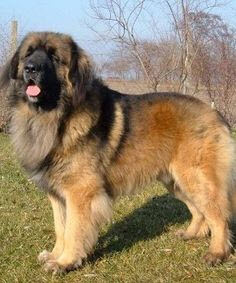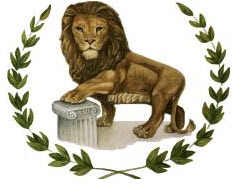| According to legend, the Leonberger was purportedly bred to be an elegant dog in the spirit of a lion that would mimic the lion in the town crest. Heinrich Essig, claimed to have created the Leonberger breed by combining the original stock that made the St. Bernard with white Landseer Newfoundlands and then injecting some Pyrenean Mountain Dogs (Great Pyrenees). World War I almost rendered the breed extinct. After the war, Karl Stadelmann and Otto Josenhans scoured Germany searching for Leonbergers; they found 25. In 1922, a group of seven people joined together to form a breeding cooperative which brought about a revival of the breed. |
Leonberger’s full coat tends to shed a lot, requiring daily brushing. They need regular, moderate daily exercise and are rambunctious when they are puppies. Leonberger’s benefit greatly from consistent, firm, loving socialization and training that will help ensure a mannerly, well rounded, 120 - 170 pound dog. They are not a dog for the novice owner.
Leonberger’s are generally healthy dogs. Like all large breeds, they can suffer from hip dysplasia which is largely controlled because of the effort of many Leonberger breeders who actively screen their dogs and leave dysplastic specimens out of the gene pool. Though not common, Leonbergers do inherit and/or develop a number of other diseases; heart problems, Inherited Leonberger Paralysis/Polyneuropathy, osteosarcoma, hemangiosarcoma, Osteochondrosi Dissecans, allergies, digestive disorders, cataracts, entropion/ectropion eyelids, progressive retinal atrophy, perianal fistulas, and thyroid disorders. They have an average lifespan of 8 to 10 years.
For additional information on Leonbegers: http://www.akc.org/dog-breeds/leonberger/
Leonberger’s are generally healthy dogs. Like all large breeds, they can suffer from hip dysplasia which is largely controlled because of the effort of many Leonberger breeders who actively screen their dogs and leave dysplastic specimens out of the gene pool. Though not common, Leonbergers do inherit and/or develop a number of other diseases; heart problems, Inherited Leonberger Paralysis/Polyneuropathy, osteosarcoma, hemangiosarcoma, Osteochondrosi Dissecans, allergies, digestive disorders, cataracts, entropion/ectropion eyelids, progressive retinal atrophy, perianal fistulas, and thyroid disorders. They have an average lifespan of 8 to 10 years.
For additional information on Leonbegers: http://www.akc.org/dog-breeds/leonberger/


 RSS Feed
RSS Feed